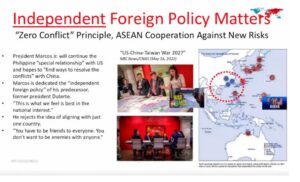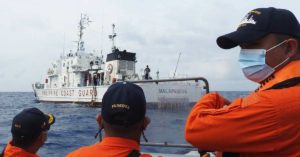ON China’s proposal to hold joint military exercises with the Philippines, I think the Marcos administration should give it a chance, think about it prudently and be more open-minded about it. I believe it will be advantageous to the presidency of Ferdinand Marcos Jr. to pursue diversification of the country’s military cooperation with neighboring countries, even with China, to avoid too much dependence on the United States, militarily speaking. Most importantly, a joint military exercise between the Philippines and China, to a considerable extent, will facilitate and promote the deepening of mutual understanding between the two countries and will serve as a confidence-building measure that may further promote good bilateral relations, not just economically but even in the area of defense and security. I believe it’s time for the Philippines to pursue the diversification of its military cooperation with countries other than the US, the likes of Asean member states, China, Russia, India, and others, through various joint military activities.
Hence, China’s proposal to hold military exercises with the Philippines deserves prudent consideration. This will, to a greater extent, demonstrate and prove that, indeed, the Marcos administration is pursuing an independent foreign policy, friends to all and enemy to none.
Military cooperation vs military alliances
I would like to point out as well that there’s a need for the Philippines to shift gears, and adjust to the sense of time and the emerging multipolar world. As a country, we should pursue more military cooperation with many countries as much as we can, especially with our Asian neighbors, and do away with military alliances or lessen them to a greater degree.
There’s a difference between military cooperation and military alliance. A military alliance is a formal agreement between nations concerning national security. A treaty is needed for a military alliance that Congress must ratify before it can be effective. Also, military alliance purports that in the agreement, countries’ parties to the treaty contribute to the defense of other countries in the event of a military crisis.
Military cooperation is military diplomacy that aims to foster bilateral and regional relations. Military cooperation may include joint military training, joint military exercises, drills, joint patrols, radar inputs, intelligence sharing, exchange visits of military personnel and exchange of information, which facilitate and build close ties between countries.
Military cooperation is not equivalent to a military alliance, or military or political subservience or servility. Instead, it facilitates the groundwork for a contingency of military interoperability between and among nations.
Military cooperation helps strengthen strategic security relations and address common security concerns between countries, forging military partnerships and diplomacy.
Military cooperation is vital in the process of developing close ties with the military forces of neighboring countries, and much more with the military forces of Asian neighbors and Asean member states to build trust, confidence and enhance collective regional security.
Military cooperation, both in traditional security threats and nontraditional security threats with other countries other than the US, especially with our Asian neighbors like China, is a crucial peacetime activity as it reinforces the country’s foreign and security policy objectives with the ultimate aim of maintaining peace, establishing mutual trust, developing cooperation, and enhancing stability and security in Asean and the broader Indo-Pacific region.
Nontraditional security refers to human security concerns such as climate change, food shortage, resources such as energy, infectious diseases, natural disasters, transnational crime, human and drug trafficking, and mass migration. By contrast, traditional security refers to threats against the essential values of the state, territorial integrity, political sovereignty, and the like.
Forging military cooperation with countries other than the US helps build linkages with other countries, which in many ways helps create an atmosphere of shared and common understanding amid challenges and differences in the ever-changing, ever-challenging and volatile Indo-Pacific region.
Conclusion
Given the critical role of the executive branch headed by the president as “sole author” of the country’s foreign policy as mandated by the Constitution, President Marcos, presidency plays a decisive and critical role in determining the contours of Philippine military cooperation with the rest of Asia and countries like China vis-à-vis the US-Philippine military alliance as the world is gearing toward a multipolar world from a unipolar one.
Source: The Manila Times
https://www.manilatimes.net/2023/08/05/opinion/columns/on-chinas-proposal-to-hold-joint-military-exercises-with-the-philippines/1903908



